

|
Back to |
| The Front Page |
| People |
|
Moving and shaking
the World Croquet Federation
Croquet World Editor Bob Alman interviews Brian Storey, Secretary-General of the WCF Layout by Reuben Edwards Posted June 25, 2005 |
Brian Storey of England took on the unsalaried job of Secretary-General of the World Croquet Federation in early 2005 and immediately set about moving the organization to a new level of awareness among both croquet players and the general public – in tandem with its new president, David Openshaw. He soon expanded and greatly improved the organization’s website, and as the northern hemisphere summer approached, he began blanketing the media with news bulletins on the WCF’s major 2005 events. Storey, 57, retired from his job as a Detective Inspector in a Child Protection Unit in the late 90’s and then became the secretary of the only full-time professional ice hockey league in the UK and later its CEO. He currently has a full-time salaried position in the Child Protection field for the Salford City Council. He has long taken an active role in his local croquet club. He lives with his wife in a suburb of Manchester
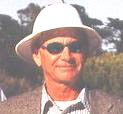
|
| Bob Alman, Editor of Croquet World Online Magazine |
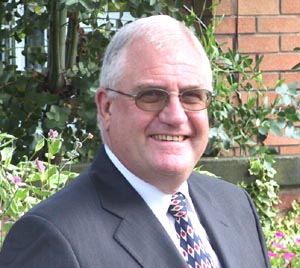
|
| Brian Storey, Secretary-General of the World Croquet Federation, in the garden of his home in Cheshire. |
BOB: And then there was Tony, and that was a big change.
BRIAN: When Tony Hall took over the presidency, he had the personal opportunity to promote the organisation like no one had before, which he did with great gusto and very effectively too. He seemed omni-present and his enthusiasm was well received everywhere. In a sense, though, it emphasises the Achilles heel of the WCF in particular and the sport of croquet in general where it seems all croquet clubs, associations and federations around the world rely on volunteers, who seem ever decreasing in number, to carry out the varied functions that promote the sport. The WCF is no different in that respect. However, the amateur status of the sport does not mean it should not be run along professional lines.
BOB: That's always going to be a huge challenge, to have a volunteer-based amateur association operate like a professional organization. God knows - and this magazine has often reported - the problems that causes. Typically, there is a low level of actual accountability and follow-through, and that can cause endless grief for the people who actually are trying to get something useful done.
BRIAN: I read recently a comment that the WCF is not accountable to anyone, but of course, that is totally wrong. The WCF is a members' organisation of National Associations run and controlled by them through the WCF Rules and any resolutions passed at General Meetings. It is actually they that ultimately dictate the pace and style of management of the WCF. They elect the WCF President and Management Committee and appoint the Treasurer, (although I do find it curious that the Secretary-General is appointed by the Management Committee). So everyone in that WCF hierarchy is responsible to the membership.
BOB: Yes, but that's my point, it’s so very vague, so diffuse. Where does the buck stop, really?
BRIAN: To directly answer your question, I think a useful analogy can be drawn with the structure of a trading company although the aims and objectives are of course different in WCF terms. At the “bottom” you have shareholders, (WCF National Associations) who have an investment in the company. They want to see it prosper and develop to achieve their aims. That may be money-motivated in corporate terms, but whatever it is, they decide on the Board of Directors (WCF Management Committee) who then set out an agenda to achieve those aims. A slight departure here is that the Board of a trading company will then elect from within a Chairman of the Board; but in the WCF it’s actually the members that elect a President. The Board of the trading company then appoint a Chief Executive (WCF Secretary-General) to run the organisation along the lines dictated by them to achieve the aims and objectives of the company and satisfy the shareholders (WCF National Associations).
Of course that is an analogy. While it is accurate, it only tells part of the story. The relationship between a President and Secretary-General is a particularly important one. The President is the main public face of the organisation, the main link to the “executive” and the policy driver within the Management Committee. The Secretary-General on the other hand is the “executive” and carries out the wishes of the Management Committee, communicated via the President through an administration (albeit small) with the help of those around him. WCF is lucky in having a small band of people from around the world that have offered their help and advice in specific key areas and form part of that administration on an ad hoc or regular basis.
BOB: But Brian, so far, it seems that you as Secretary-General actually have a more visible and pervasive "public face" than the president of the organization, just as Chris Hudson had in the early days when he was the "founding" Secretary-General.
BRIAN: The current WCF President, David Openshaw, is well known throughout the croquet world, having a very impressive international career that is not over yet, so I would not say his profile is a low one. I guess the only reason I may be “seen” more publicly at this time is through the development of the WCF website and my objective of trying to achieve a higher profile for the organisation. My natural inclination is to be very much behind the scenes.

BOB: Certainly you - and the WCF currently - have a very high profile on the Nottingham Board [email newsgroup]. It seems that every few you days you put out a news release on something or other. Currently, most of them are about the players selected for the world championship upcoming, or the first Women's Golf Croquet World Championship in November. I acknowledge that the - what, 500? - subscribers on the Nottingham are certainly the prime target for croquet publicity, but is it possible you're over-doing? What's your aim with all those press releases? How will that affect the success or economic viability of a world championship that typically gets very little media attention and therefore not many sponsorship bucks?
BRIAN: I think in your question you have hit the nail on the head. The key word here is "publicity". I am sure all of us involved in croquet are well aware of the relative small nature of the sport and the difficulties we have had in getting the exposure it deserves. It hardly measures on the "Richter scale" of large popular sports that would otherwise allow us the opportunity to advertise a game that calls for great skill and tactical prowess. While in mature croquet playing nations there are a number of high quality events taking place, the closest we come to on a global scale are the WCF World Championships of the Association and Golf Croquet variants. WCF objectives include the encouragement, promotion, teaching and developing the recognised versions of the game of croquet internationally at all levels. I believe the best way to publicise the sport is to use the WCF marquee events to achieve those objectives.
As for over-doing it, well if we could say, with some authority, that Neil Armstrong had found a croquet set on the moon, we would be well pleased. The type of coverage that we need will have to be self generated in one form or another; we can’t wait for the media to come to us. Media Releases can take many forms but I have concentrated at this time on the lead-up to the 2005 WCF World Championship. I not only circulate it to WCF Members, WCF Friends and the Nottingham Board, as the most widely read within the sport, but also to a growing list of mainstream media contacts. Its a bit like sowing seeds, if you sow enough some will grow, and the pictures of the World Championship entrants is a perfect opportunity to give a message that there are two WCF World Championships taking place this year. On a lesser scale, it gave me the opportunity to ensure that the WCF web site ticks over with, ideally, a story a day – which gives it more prominence on the search engines.
On a bigger scale though, this publicity projects the sponsor’s name. For the World Association Croquet Championship, the Croquet Association (of England), rightly take pride in obtaining the sponsorship from Mitsubishi Motors but I definitely think we should all play our part in assisting in that process. Every opportunity must be taken to portray their name in a positive light.
BOB: Very well said! And I say that as a guy who has sometimes been flattered in being addressed as "Mr. Hype." Pleasing the sponsor is absolutely at the top of the list, and I can't help thinking of the failed history of the "big purse tournaments" in the U.S. in the late 80's. If the sponsors had been given their due, if they felt it was worth it, they would still be around, and their money and their media clout would have helped immeasurably in promoting the sport here in America.
Working so long with the hockey league must have taught you a lot about the business of sport. Does any of that experience carry over to your WCF job?
BRIAN: Oh yes! Sport is a business, and it matters not that it is primarily amateur or fully professional, the approaches must be the same, although the end results may differ. It needs a strong Board of Directors who will not shirk from making the hard decisions that ensure that the organisation remains financially viable and lives within its means. That can sometimes lead to dull, slow progress but it’s worth it in the long term.
BOB: Now Brian, this seems like a good time to ask a really nasty question. It seems to me that in the early days of the WCF there was a lot of bitching and moaning from Brits about the organization. You know what people muttered: that England wanted to control everything in the sport, that the British Open had always been the virtual "world championship", and that the Brits really weren't supporting this diffusion of croquet throughout the world. Now, I can't help noticing that for the first time, both the Secretary-General and the President are Brits. The British Open has always been, for all practical purposes, a virtual World Championship, and this year there is the traditionally very strong British Open and then scant weeks later the WCF World Championship. And nobody is complaining a bit about England being the unequivocal center of the croquet world. Is that sheer happenstance, or clever politics, or some happy mixture?
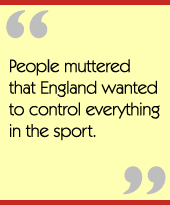
BRIAN: Wow, Bob! That's a bit below the belt.
BOB: Just a bit, but I have to ask, I'm a journalist.
BRIAN: As an Englishman, I can be as parochial as the next man or woman, but to answer that I must say that I can only speak for myself. I know when the WCF was first set up there was an apparent conflict between the Croquet Association (of England) and the other WCF Members. The CA seemed to think that the WCF was an organisation dominated by those beyond the White Cliffs of Dover and therefore inherently bad. The other WCF Members seemed to think it was dominated by the CA with all of "Albion's perfidy". Whatever the truth, there was conflict with seemingly a big divide. And it's perfectly true that mainly the UK psyche has, over time, been skeptical about attempts to integrate it into sporting structures involving other countries. There are exceptions of course, but for the most part it is the unique history of the UK, where so many sports were developed with rules applied for the first time. This includes Croquet.
BOB: And it probably makes a difference that croquet is one of the few sports in which England still dominates.
BRIAN: Yes, croquet is strong in the UK, lots of great players and social players and reasonable facilities. Distances are generally no problem. So why would the CA "need" an organisation that could potentially dictate to it what it should or should not do? Why do we need a World Championship of this or that if most of the world's top players compete in the British Open anyway? Of course, all International Sports Federations have suffered from similar dichotomy in their formative years. How much power do National Associations give to a World body? How do they control that power, if it is granted to them? Who funds it and on what basis? All perfectly reasonable questions, that do need answering.
BOB: So Brian, answer!
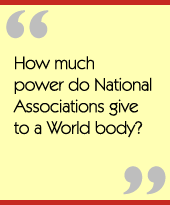
BRIAN: The challenge for the WCF is to satisfy ALL its members that it has a role on a wider scale where it can offer something back to them. The real question to be asked is, "What you we want the WCF to do?" The August 2005 General Meeting of Members will answer some of that. I am clear in my mind where I think the WCF should be going but that needs testing through discussion and argument, which is always difficult, as there’s a long time lag between these General Meetings. The WCF objectives are the key here, they give the targets that all Member Associations have signed up to, and it is up to us all in the croquet community to define the paths to allow WCF to do that with all the support required.
As you indicated, it is sheer happenstance that has led us to the position where the President and Secretary-General positions are held by persons of the same nationality. Both David Openshaw and myself discussed this prior to my appointment, but both of us felt we could overcome the potential for bias in our dealings with Members. I hope we have.
Now I just want to make a quick point regarding the British Open v WCF World Championship. Both satisfy similar needs for strength players, but the World Championship also provides a development potential that must not be missed. Players from emerging nations or their associations will benefit from their involvement and it does allow for the opportunity to develop sponsors on a global platform too.
BOB: Whew! I'll try to make my questions smaller, Brian, and one at a time. No more multiple questions! Okay, so we're talking about "the World Championship", but when you say that, you really mean the "Association" World Championship. I know that the WCF is chartered to produce world championship in Association, American Rules, Golf Croquet, and the 14-point game. All of that has happened, except the American Rules championship. Such an event should obviously be held on the North American continent, and I know there have been various proposals floated, and I don't know why it has never happened. I imagine, though, that the payment required to the WCF to sanction it might be an obstacle. That one thousand pounds sterling the WCF requires right up front puts quite a crimp in the budget for a small sport. I remember my own considerations about the up-front deposit requirement when I negotiated for the Golf Croquet World Championship that opened the National Croquet Center in 2002. Any comment on prospects for an American Rules World Championship?
BRIAN: You are right, I am talking about the Association variant. I must admit, I too, am unclear as to the reasons that an American Rules version has not taken place. It's the most popular version of the sport in North America and so it seems obvious that USA or Canada could and should host it, certainly initially. The NCC in Florida is well placed as a potential venue and the USA has shown it is perfectly capable of hosting large croquet events.
I’m personally keen to resurrect the 14-point team event too, last played for in 2000 in Italy. I think it would complement the MacRobertson Shield perfectly. We must not forget the "Short" and "Two ball" variants too, although I have always thought that the latter would be perfect as a separate but contiguous event within an Association Croquet World Championship, dependent upon time and lawn availability. Of course, we do need bidders for all of them!
You’ve cited the sanction fee as an obstacle, and if that is the case we need to talk about that but I actually cannot see that as significant reason for not holding it. However, it does raise an important point that all bidders for WCF events must consider. Is the whole event financially viable? WCF are acutely aware of the resource implications required in hosting any WCF event and that is part of the consideration when deciding who should get what. There is no appetite for encouraging over-stretching limited finances just for the sake of holding an event. Very few national associations actually have the infrastructure to host a WCF event, so I think it is likely that for the next few years we will be dependent upon the big four (Australia, Great Britain, New Zealand and USA) plus Egypt to regularly host WCF events. In saying that, I would want to encourage other associations to continue their own development to allow them to contribute in the future.
BOB: About the deposit, I wasn’t meaning to say that it was too much, all things considered. As a matter of fact, it’s probably a useful discipline, because when you send the WCF a non-refundable thousand pounds sterling deposit, you’d better be sure you can actually make the event happen! When I sent in that deposit, I knew the first Golf Croquet World Championship in America was definitely going to be held at the National Croquet Center in February of 2002, no matter what. As it turned out, there were huge problems, including the major one that the clubhouse was six months behind schedule and wouldn’t be open. But we were committed, we had to go through with it, and though there were some big kinks, even I was surprised at how smoothly it went. It was a great dress rehearsal for the Macrobertson Shield the next year, too.
BRIAN: So let me throw your question back at you, Bob: Why doesn't the National Croquet Center host the first American Rules World Championship?
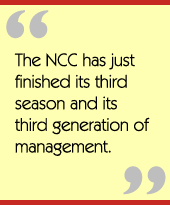
BOB: Well, you're asking at an awkward time, because the NCC has just finished its THIRD season and - as it turns out - its THIRD generation of management. Mike Jenner was here for 15 months and accomplished a great deal in organizing the Center on a sound professional foundation for further growth. Plenty has already been said about the false starts and inadequate management and staffing of the Center in the past - largely stemming from radical under-capitalization, a problem that has now been solved. And the truth is, it's a good time of year for a shift in management, as we go into the very slow summer season here in South Florida. And the plain fact is that the new manager will probably be engaged for some time in just taking hold of the reins, and not thinking about new croquet tournaments.
BRIAN: Fifteen months isn't really that long. Is this a healthy change?
BOB: I think, to put the best face on it, that the croquet establishment has had to confront a steep learning curve in taking on the management of what is, really, the first "big business" in the croquet world. You can look back at Wimbledon as perhaps the best precedent for the National Croquet Center, and when you notice what a short time Wimbledon lasted as a croquet venue, maybe you can appreciate the enormity of the task here for the Croquet Foundation of America - the owners of the NCC, and the body responsible for its well-being and survival. If you take a long view of what has happened here - and I should know, I've been here on site for four and a half years - you see a gradual de-politicizing and an increasing respect for professional values in marketing, sales, corporate communications, the whole gamut of management and operations. Each generation of management has made its contribution, and the substantial contribution of the last one has been to put into place rigorous standards of financial accountability, radical cutting of expenses, expanded staff, especially in sales and marketing, and an overall commitment to the essential bottom line.
BRIAN: How can the next generation of management improve on that?
BOB: This is only my opinion - I am only a consultant here, my office is here, I'm a tenant, I operate my WicketSports Unlimited business from here, and I maintain the websites from here, but I have not been significantly involved in the day-to-day business of the Center for almost two years. Nevertheless, I have been close enough to see that each generation of management has made its own contribution on the shoulders, somewhat, of those who came before. I think the next big hurdle is perfecting the members club, making sure everybody in South Florida knows that the National Croquet Center is just about the biggest bargain you can find anywhere both as a social club and as a sporting club. The clubhouse is beautiful, the dining is excellent, it's a great party venue, and the truth is that membership values have not been strongly, widely, and publicly promoted for a long time. There has been some loss of momentum in this one area. That’s understandable, as the highest priority was to expand revenues quickly through increased event sales. And that has happened. So now, I think the time has come to expand membership services and membership numbers. If that is done successfully, the Center will have a brilliant future, I think.
BRIAN: So what happens now?
BOB: As of this date, I’m happy to report that the Croquet Foundation of America has hired a manager from outside the croquet world – a professional club manager - and I think that's a great idea. If the next breakthrough to be made here is in the members club, it looks like the Center is right on track. Everything the new manager needs to know about croquet and the croquet culture can be quickly learned. The rest he can apply from a long and successful background in club management.

BRIAN: Don't you already have a lot of members?
BOB: Depends on what you mean by "a lot." I think there are about three hundred members now, and the membership is still going up. Of course the Center has attracted some new people to the sport, but not that many as yet. The NCC has been quite successful as a "vampire club", attracting members and co-members from other facilities in Palm Beach County, but not nearly as successful in attracting new players to the sport. This is, of course, the challenge of the facility as a showcase to spearhead significant growth of the sport in the USA. That was the explicit purpose of Chuck Steuber from the beginning - he was the president of the CFA who founded the Center and donated his personal millions to make it happen.
So much more is at stake here than a single Center, not just for the USCA and croquet in America, but for croquet everywhere. I am beginning to believe that when this Center begins to post black ink, other facilities around the country and perhaps around the world will copy its success formula and prove that a well-managed and professionally marketed business can be established and run that combines a MEMBERSHIP CLUB as well as an EVENTS CENTER catering to private parties and corporate groups.
BRIAN: You're right, we'd love to have a model like that. Your founder's purpose is consistent with the purpose of the WCF, to attract new people to the sport. It's not hard to imagine a revenue-positive NCC duplicated in England and the European countries, and even in Egypt and Australia.
BOB: Your citing of Egypt's capacity for producing world events prompts me to ask about something that's been on my mind for as long as I've been organizing and publicizing events in this country - more than two decades. And that is "women's events." About 15 years ago, I decided to do a "Women’s Championship" in San Francisco, and I publicized it widely, only to be met with outrage and something like an organized boycott. If I can generalize, the outraged women said that this event was "turning back the clock" to the time when women were second-class citizens. I think I understand this point of view, but I was really surprised and shocked at the vehemence behind it. I viewed it not as a take-away from women, but a chance to GIVE them something - that is, to compete at top level against other women, something that NEVER happens in this country, because of our much-touted egalitarianism. So Brian, how did this Women’s World Championship in Egypt happen without generating that kind of outrage and indignation, if not an actual boycott?
BRIAN: The response you got from the ladies probably shows a strong maturity in the game. Way back, almost at inception, the WCF made a decision that there would be no separate Men’s and Women’s competitions because, as you have said, the sport can and is played on an equal basis and many women can hold their own and beat men on a regular basis. That said, women are still under-represented at the top levels of the sport in its different versions.
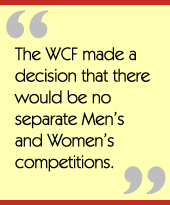
The hotbed of Golf Croquet in the world is Egypt. That is where the bulk of the best players are and most of them are men, too. The president of the Egyptian Croquet Federation, Amir Naguib, considered that if the croquet community is to assist in developing women players, there should be a separate competition just for them. After a lot of deliberation, the WCF decided to support his idea. In addition, it is hoped that an increase will be made to the membership of the WCF National Associations through this initiative as it is believed that there are Golf Croquet clubs that are not part of their membership. Here in the UK it is often thought that the only reason the men’s part of the Men’s and Women’s Association Championship was created was because the Women were consistently beating the men! I know that the idea of holding a single-sex championship is not universally popular but I hope everyone gives it a chance. The first event is actually over-subscribed - if that is an indication its level of support.
Now can I ask about the American Rules Game and the ranking system? Are there any plans to introduce one in the future?
BOB: You've noticed that we have no ranking system for the American game! We also, as of this month, have no handicap system for the International Rules (or Association) game. As editor of the USCA Website, I just recently got the request to abandon the very unsatisfactory handicap system we had for "Association" play in the USA, so now, we are simply linking to the official WCF North American rankings. Of course, that's not a handicap, only a ranking, so the next step for the USCA is to figure out how to convert that ranking to a handicap number. It might not be such a large issue here, because there is no tradition in America of handicap play. The handicaps only serve to divide tournaments into different divisions, or "flights" as we say in America. But all this should please you, Brian, it's just another small step in the internationalization of the sport, using the universal standards supported by the WCF.
Brian: So you now have rankings for Association play, but no handicaps, and you have handicaps in American Rules play, but no rankings.
Bob: Precisely. But I don't think anyone attaches great importance to the lack of a ranking in American Rules, because we do have our somewhat elaborate Grand Prix system, to acknowledge successful tournament play at all levels – and in both forms of the game, incidentally. Our incoming USCA president, Rich Curtis, was a major architect of that system, and it works remarkably well, now that all the bugs are out of the programming. Also, of course, we have our annual national championship, which is taken pretty seriously. The winner, I think, is acknowledged to be the true and deserving American Rules national champion. And behind all that, we do have the American Rules handicap system, which is finely calibrated and programmed, and I think people accept those handicaps, pretty much, as a fair ranking.
Now, unless you want to interview me further, I think maybe we're getting close to the end of this. So I think we should end on a personal note, like, When do you sleep?
BRIAN: At this time the job for me is more of a fact-finding mission, I have so much to learn about the organisation and how it works, particularly the politics. So at the moment things are going smoothly and I sleep very well.
BOB: But how long can you put up with a volunteer job this intense?
BRIAN: Well, I anticipate that from August onwards the job will become pretty hectic. If all the proposals that have been made for the WCF General Meeting and Management Committee Meetings are accepted and passed, there will be a considerable amount of work involved to bring those ideas to fruition. For me, that’s actually the enjoyable part, seeing the development of ideas manifesting themselves into actual action. It can give all involved a feeling of satisfaction. I have given myself about three years as a sort of tenure on the job before the WCF probably gets sick of me but really it’s the sort of position where a regular re-evaluation is required from everyone involved to ensure that it does not become a sinecure.
BOB: But in the meantime, how can you afford to spend so much time doing an unsalaried job?
BRIAN: A limited number of jobs are eligible for claiming an honorarium, at the discretion of the Management Committee and members, at year’s end, including the Secretary-General. I haven’t decided yet whether to do that. It depends on what the overall workload for the whole year is, how I feel, how poor I feel I am and if my wife wants a night out.
BOB: But you're really a high-level volunteer, and that might have some benefits: Haven’t you noticed that the very fact of your volunteer, unsalaried status actually gives you power you wouldn't otherwise have, the power to do what you think needs doing? Power you wouldn't have as a salaried administrator, where people would be more likely to treat you like a clerk?
BRIAN: Ah! Power without responsibility and tomorrow the world! I don't see it that way myself. I guess I have some latitude, in that apart from the WCF Rules and decisions already made on their interpretation, I have complete freedom to operate. In reality it does not work like that. Personally I always work to try to find consensus and of course the continuing dialogue with WCF Management Committee members gives an insight into how things are viewed around the world. I think all the Management Committee are given the task of taking things forward and its not just me or the President that have that responsibility but we are in a better position because we are more central to the processes involved and hence hopefully have a better overview. Of course that in itself does not necessarily lead to better decision-making, perhaps a better looking committee camel, but it gives us a head start.
In my involvement with a few sports over the years, I have always been critical of the lack of an impact assessment, particularly where decisions are made "on the hoof" without previous thought or discussion. I remember on one occasion when a Director of a Sports League I was involved in made a proposal from the floor to change the number of points awarded for a win in overtime. It had not been promoted by the League Executive, of which I was part, nor even suggested by anyone prior to the meeting. It was proposed and without any sort of assessment made was passed because the person making it had the force of character to do so. It was overturned three weeks later when the Executive showed the likely impact would actually harm the sport, given the mental approach of the players and coaches. Those kinds of things are burned in my brain as good lessons on how not to do things. No, the sport is too small to start to work as a maverick. That route will only lead to to disaster.
BOB: Okay, just to make sure we’ve covered everything, I think I should ask you what, in your view, are the “burning issues” of the WCF right now?
BRIAN: There are a few things that do need sorting. All of them are up for discussion in August at the next WCF General Meeting. Chief amongst them relate to Child Protection Procedures and Anti-Doping.
On the former, as you would expect with my background, I am a strong believer in making sure that kids introduced into the sport are protected from those that may take advantage of them. It would serve the sport no good at all if a coach was involved in something unsavoury that would or could have been preventable. I am aware that a lot of Member Associations already have procedures in place to satisfy local ethics and domestic regulations, but an awful lot do not. By adopting the UN Conventions on the Rights of the Child, the WCF can give assistance to those that want it whilst gaining experience from those members that have had good and bad ones in the past.
In relation to Anti-Doping, many member associations already have adopted the WADA protocols and I believe that the WCF must do so too. I think it is too important not to. I know there is resistance to it in some quarters, but we must overcome these if we ever to be taken seriously by the International Sporting Fraternity. It is an essential element in the building of the organisation.
The other important bits are the building of current Rules, but adding those bits like Regulations to make them work in a practical way. That will help administrators such as me but also be a valuable reference guide on how we do things.
One interesting piece of future work is to identify and recognize the personalities that have contributed to croquet throughout the world over the years. The concept of a WCF Hall of Fame is not a new one and will, to some extent, mirror those already in existence, but from a WCF perspective will be more International in flavour. There will be proper guidelines for induction processes but it will be web based on the WCF web site. We need to recognize those contributions in some way. In the early days we will have to phase in players and builders that are long dead, like say, Peel. It will take a few years to do that – just catching up purely from a logistic point of view.

Probably the most significant part of the current year and into next will be the development of the WCF Business Plan. Based on the current objectives of the WCF, the current draft plan identifies the component parts and will lay out the progress to be made on key issues that will take us well into the next five years. It goes without saying we will need volunteers to make it all work.
Finally, a thing close to my heart: development. The big four countries have mature organizations with a significantly large membership and the experiences of yesteryear. That is not the case with the smaller members who are desperate to emulate the big four. They need help, whether it is grants or loans for equipment and infrastructure or access to experienced people. WCF can and must help with that. I see that as the legacy that WCF can build and be proud of in the future. Ideas are now well developed and we only now need the discussion and vote to make it happen.
Life in the WCF may be very interesting in the next two years or so.
BOB: Which brings me, I guess, to the last question: From a personal perspective, what would you like to accomplish during your tenure as Secretary-General of the WCF?
BRIAN: My main objective is to ensure that the WCF is administratively strong, with a definite sense of purpose for the benefits of all members. Sounds like a sound bite I know, but that’s how I am approaching the job. Part of that is the draft WCF Business Plan and how it will allow the WCF to maintain or attain its objectives in the future. My ultimate aim would be to see Croquet as a Summer Olympic sport because if we ever got that far, we know that the WCF has really matured. Okay, I know its pie in the sky at the moment, and I will not live to see the day, but we should have a dream, shouldn’t we? Even if we get part way down that path then we will have contributed enormously to the enhancement and awareness of the sport. I want to be have been part of that when I leave.
BOB: If you achieve only a quarter of what you’re shooting for, the sport will be well advanced. Good luck to you, Brian.